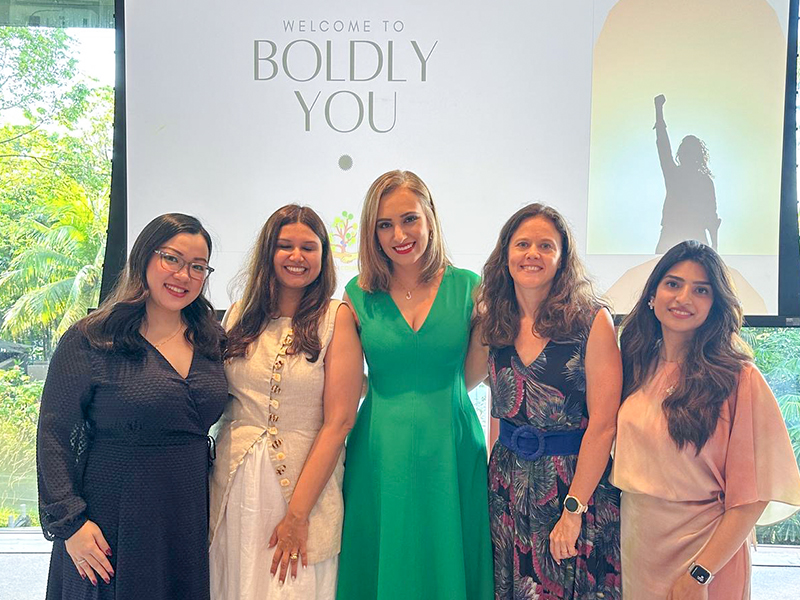For many, wellness means yoga mats, protein powders and fitness trackers while mental fitness often gets pushed aside until things start to unravel. To explore why – especially around ADHD in women, where symptoms are frequently missed or minimised – we spoke with DR SANVEEN KANG, clinical psychologist at Psych Connect. She explains how therapy retreats are reframing mental health as proactive self-care rather than something to reach for in crisis. And, if you’re curious to try a structured reset, Psych Connect’s four-day “Boldly You!” ADHD retreat for women is coming up.
A closer look at mental fitness and ADHD in women
So many of us schedule workouts religiously, but rarely leave time for therapy. What’s behind that gap, and how does expat life impact mental health?
Dr Sanveen Kang: “For many, wellness routines focus on physical health – exercise, diet and sleep – while mental health is overlooked until challenges become overwhelming. In fast-paced environments like Singapore, where relocation, demanding careers and family transitions intersect, mental fitness and wellbeing is often the first thing sacrificed.
Although stigma is reducing, many still believe therapy is only for serious psychiatric needs. Everyday struggles such as stress, burnout or relationship strain are brushed aside as not significant enough to warrant help. The high-achiever mindset often equates resilience with pushing through, leaving little room to see therapy as part of overall health. Unlike physical routines, which are visibly rewarded, mental health support is undervalued; yet it’s just as essential for long-term success.”
Why do so many wait until breaking point to get support?
Dr Sanveen Kang: “Many put off seeking help because they tell themselves, ‘I should be able to cope’, as if asking for support would be a sign of weakness. Stress or burnout is brushed aside with the thought that “it’s not bad enough”, while struggles are minimised through comparison – ‘others have it worse’. Help is often only sought at breaking point, when performance falters or relationships collapse.
The truth is that mental fitness is not just for crisis. True wellness is not about surviving; it’s about creating space to thrive, for yourself, your family and your future.”
What makes a retreat for women different from one-on-one therapy?
Dr Sanveen Kang: “Group formats such as women’s ADHD retreats, Dialectical Behaviour Therapy (DBT) skills groups, or couples’ weekends provide something individual therapy cannot replicate: connection and community. Loneliness and isolation are strongly linked to depression, anxiety and even physical health issues. For expats, neurodiverse clients and families, realising they are not alone can be just as therapeutic as the strategies they learn.
In group settings, participants don’t just talk about strategies, they practise them in real time. They gain insights from peers as well as clinicians, making therapy practical and immediately relevant. Retreats also condense weeks of therapy into a few immersive days, helping to prevent therapy fatigue and boost motivation.”

Why do shared experiences like retreats for women work so well?
Dr Sanveen Kang: “Psychologically, one of the most important mechanisms is universality – the relief of realising, ‘I am not alone’. This reduces shame and self-blame, creating space for growth. Social learning also shows that people model behaviours they observe in others, so watching peers practise coping strategies makes change feel achievable.
On a neurological level, mirror neurons fire when we observe others, allowing us to empathise and mentally rehearse new behaviours. Group bonding increases oxytocin, which reduces fear and fosters trust. Positive shared interactions trigger dopamine, reinforcing learning through the brain’s reward system, while repeated experiences strengthen neural pathways so that new skills stick. This is why retreats can shift perspective and sustain habit change more effectively than working alone.”
Expat life can look glamorous from the outside. Why might it actually make mental health support even more important?
Dr Sanveen Kang: “Expat life offers adventure and opportunity, but it also heightens vulnerability to stress. Leaving behind family, friendship, and professional networks can create loneliness, and isolation significantly increases risks of depression and anxiety. Even highly skilled professionals often experience a dip in wellbeing during transitions.
Relocation also disrupts identity. Professionals may face career breaks, spouses can feel a loss of status, and children navigate third-culture identity challenges. Added to this is the constant ‘chase for more’ that often defines expat life. Each move creates a dopamine spike that fades quickly, reinforcing the cycle of restlessness. Together, these dynamics make intentional mental health support and community even more essential.”
What actually happens at Psych Connect’s ADHD retreat for women?
Dr Sanveen Kang: “A retreat is not simply a wellness trend or a getaway. It is an intensive therapy programme designed to deliver meaningful change in a short time. At Psych Connect’s ADHD retreat for women, participants begin with regulation skills such as grounding and mindfulness. The following days explore ADHD identity, emotional wellbeing and practical strategies for daily life – from managing work and parenting to navigating relationships and decision-making.
The programme goes beyond talk therapy. Participants engage in yoga-informed psychotherapy, art psychotherapy, and sensory strategies alongside evidence-based approaches. They work individually on self-reflection and also in groups, practising skills and sharing experiences. Shared meals and downtime are woven into the design, creating informal opportunities for connection. By the end, participants leave not only with deeper self-understanding but also a personalised toolkit they can use every day.”
How can retreats, like the upcoming Boldly You! programme for women with ADHD, turn mental fitness into part of daily life?
Dr Sanveen Kang: “One of the most powerful shifts a retreat offers is time. By setting aside more than the usual one-hour session, participants make a subconscious commitment to their wellbeing. This signals that mental health is a priority, not an afterthought, and creates the conditions for deeper reflection and growth.
Retreats provide skills and strategies before problems escalate, embed wellbeing into daily life through experiential learning, normalise support by creating community, and ensure participants leave with personalised toolkits to sustain change. In short, they reframe mental health care as training – much like going to the gym for the mind.”
What changes do people notice after they attend?
Dr Sanveen Kang: “Feedback has been consistent: participants describe leaving with more energy, clarity and focus. Many report improved communication and empathy in their relationships, as well as greater patience in their interactions with family and colleagues. Perhaps most transformative is the shift in self-compassion. Women describe letting go of shame and harsh self-criticism, gaining a kinder and more accepting view of themselves. Alongside this emotional shift, participants leave with practical strategies that help them manage daily routines more effectively.”
Coming up: A therapy retreat especially for women with ADHD
Pysch Connect has launched the Boldly You! ADHD Retreat, a four-part retreat series for women with ADHD. Each part builds on different key themes, from regulation and identity to relationships and daily strategies.
When: November 2025 to April 2026
Where: The British Club, Singapore
Time: 9am to 5pm (includes lunch, tea breaks and toolkit)
Cost: From $817.50 for Part 1; $763 for Parts 2 to 4; $2,834 for the full series
Who: The retreat series will be led by Psych Connect’s Dr Sanveen Kang and a multidisciplinary team of coaches, psychotherapists and clinicians
Register: 9109 2024 | admin@psychconnect.sg
Psych Connect is at 10 Winstedt Road, #03-07/12/13/14/17
6493 0244 | psychconnect.sg
This article on ADHD in women first appeared in the September 2025 edition of Expat Living. You can purchase the latest issue or subscribe so you never miss a copy!
To make the most of living in Singapore, read our latest City Guide here for free!
Liked this article on Psych Connect’s therapy retreat? Visit our Health & Fitness section for more ideas.
Don't miss out on the latest events, news and
competitions by signing up to our newsletter!
By signing up, you'll receive our weekly newsletter and offers which you can update or unsubscribe to anytime.




